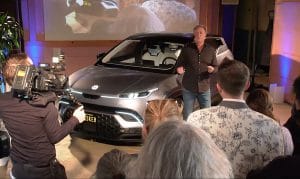
Henrik Fisker shows off the new Ocean to a crowd at the Consumer Electronics Show in Las Vegas earlier this year.
Electricity is hot! Aside from a marketing slogan that may have been used during Thomas Edison’s time it’s also appropriate now when describing the auto industry, the latest example being the move by Fisker Inc.’s plans to go public for about $2.9 billion.
The company will merge with Spartan Energy Acquisition Corp. a shell company formed by Apollo Global Management Inc., and then move to offer stock in the near future. Using a shell company to facilitate the move is a common practice, most recently used by EV maker Nikola Corp.
Ultimately, Apollo and other investors will put as much as $1.5 billion into the new version of Fisker to get the company to the finish line with the Ocean, which is supposed to be available in 2022. At some point during that timeframe, the initial public offering will likely happen; however, officials haven’t confirmed that.
(Fisker sale in the works, could take EV startup in public.)
The possibility was broached just a few days ago when the startup EV maker led by former luxury car designer Henrik Fisker secured $50 million in funding to help bring his new Ocean battery-electric sport-utility from prototype to production.
It became quickly apparent that Fisker, who has already created one EV company, which ultimately went bankrupt, was brewing up something bigger. Fisker aims to compete with Tesla Inc., which was how it went down with his first entry, Fisker Automotive. It ran into a series of problems, however, and went bankrupt in 2013, its assets sold off the following year to China’s Wanxiang Group.
However, investors think there is room for at least one more player in that space.
(Fisker lands $50M investment to help launch production of Ocean EV.)
“In electrification, we could have played in buses or trucks, but the car part is a very fast-growing market,” Geoffrey Strong, chairman and chief executive of Spartan and the co-head of infrastructure and natural resources at Apollo, told Reuters.
“While there is room for several brands, we think that Fisker and Tesla will be at the forefront of the pure-play car and SUV segment of the EV market in the years ahead.”
Though the additional funds are important for certain, where the Ocean – and any potential siblings – will be built has yet to be settled. The most likely candidate is Magna International, which builds vehicles for several automakers; however, that hasn’t been confirmed. Reuters also reported that Volkswagen’s MEB platform could be used to accelerate production.
As noted earlier, this isn’t Henrik Fisker’s first electric rodeo. After his first effort went under, he reentered the chase in November 2016, initially teasing plans for an all-electric sedan, to be called the eMotion, using a concept called a supercapacitor, rather than conventional batteries.
(By the numbers: Fisker offers plenty of specs on the all-electric Ocean SUV.)
With the technology now expected to require years of development, Fisker has opted to go back to lithium-ion batteries and, with the Ocean, opt for the SUV body style that now dominates the American market.
